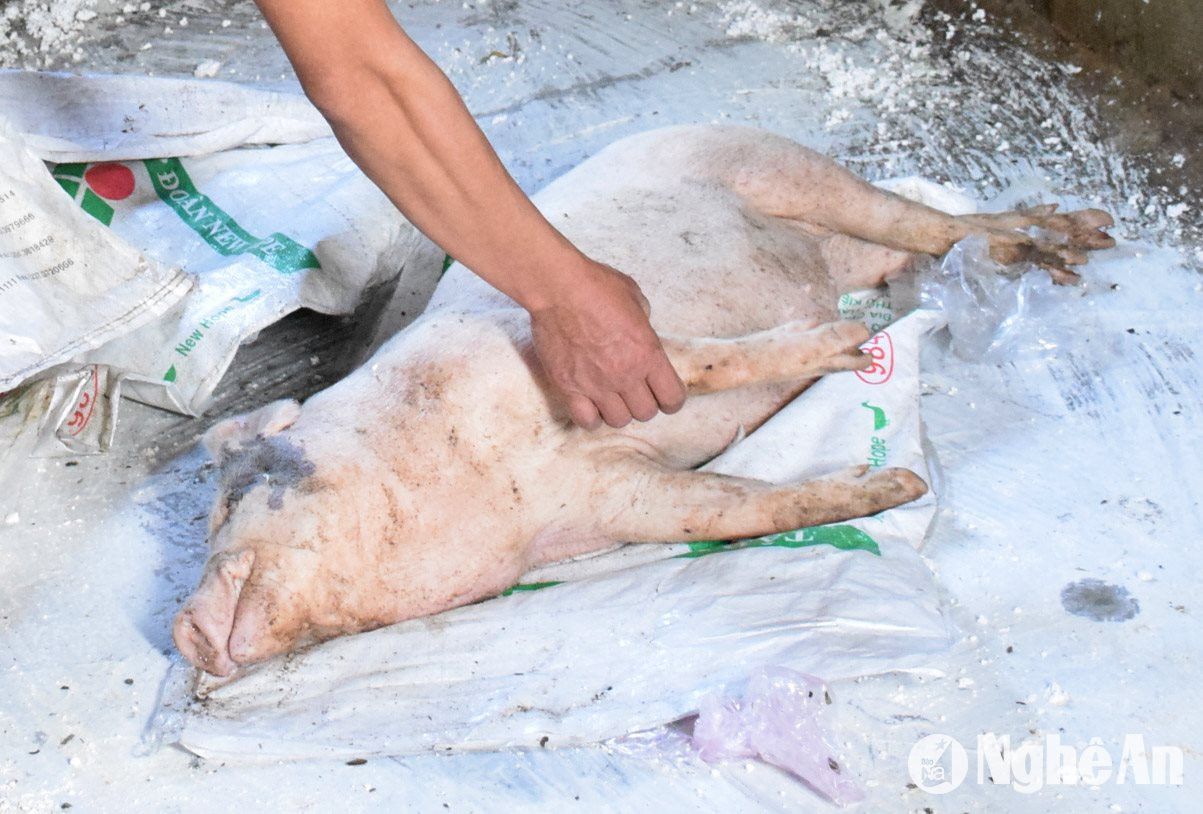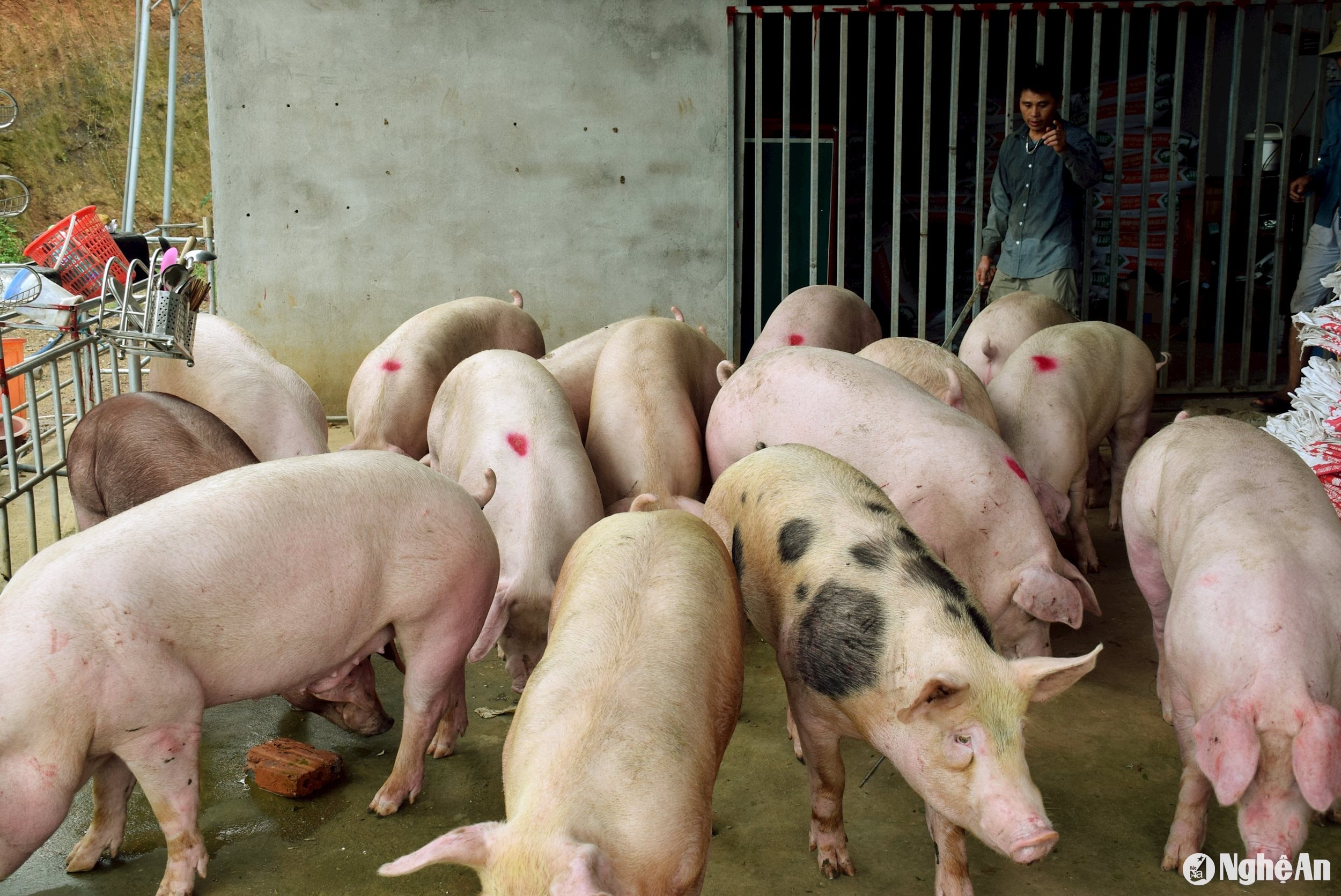Nghe An issues directive to strengthen prevention and control of African swine fever
Faced with the complicated developments of African swine fever, the People's Committee of Nghe An province has just issued Directive No. 28/CT-UBND on strictly implementing measures to prevent and control African swine fever.
African swine fever is complicated
According to the announcement of the Ministry of Agriculture and Rural Development, since the beginning of the year, African swine fever has appeared in 44 provinces and cities, forcing the destruction of over 42,400 pigs, especially in the provinces of Bac Kan, Lang Son, Quang Ninh, Hoa Binh, Son La, Quang Nam, Long An...
The epidemic is on the rise, the risk of widespread spread is very high, which can affect food supply, consumer price index and the environment.

In Nghe An province, since the beginning of the year, there have been 145 outbreaks of African swine fever in 20 districts, cities and towns, forcing the destruction of 3,470 pigs. Some localities have had many outbreaks, such as Thanh Chuong district (27 outbreaks), Do Luong (18 outbreaks), Anh Son (14 outbreaks), Yen Thanh (14 outbreaks), Nghi Loc (12 outbreaks). Currently, some localities still have outbreaks that have not passed 21 days.
Causes of the outbreak: Many localities were subjective, negligent, and lacked determination in directing and implementing epidemic prevention and control, and did not completely and promptly destroy the disease, leading to prolonged and lingering epidemics; Not allocating enough funding and human resources for epidemic prevention and control; Not setting up checkpoints to control the transportation of animals in and out of the area; Not slaughtering, buying and selling pigs and pig products at slaughterhouses and markets in epidemic areas.
Vaccination rates for livestock are low, not meeting disease prevention requirements, especially most localities do not direct vaccination against African swine fever for meat pigs.
The herd restoration, herd expansion, transportation, slaughter, and consumption of animals and animal products have not been strictly and thoroughly controlled according to regulations; cases of failure to vaccinate pigs with mandatory vaccines have not been strictly handled...
Strictly implement measures to prevent and control African swine fever
To strengthen the prevention, control and control of African swine fever in a timely and effective manner, the Provincial People's Committee issued Directive No. 28/CT-UBND dated August 8, 2024 on strictly implementing measures to prevent and control African swine fever.

Accordingly, the Chairman of the Provincial People's Committee requested: Chairmen of the People's Committees of districts, cities and towns report to the Standing Committees of the District Party Committee, City Party Committee and Town Party Committee to focus on leadership and direction; at the same time, proactively organize drastic, synchronous and effective implementation of measures to prevent and control African swine fever in accordance with the direction of the Prime Minister, the Ministry of Agriculture and Rural Development and the Provincial People's Committee, focusing on the following specific tasks:
Directly direct and mobilize local resources to organize the complete handling of outbreaks, not allowing new outbreaks to arise; organize the disposal of sick pigs, suspected sick pigs, and dead pigs in accordance with regulations and instructions on the prevention and control of African swine fever: promptly detect, prevent and resolutely handle cases of buying, selling, transporting sick pigs, and dumping dead pigs that spread disease and pollute the environment.
Proactively implement policies to support livestock farmers affected by disease outbreaks to the right target, publicly and transparently, without taking advantage of policies prescribed by law. Only support pigs that have been fully vaccinated against diseases as prescribed.
Instruct livestock farmers to increase the application of hygiene and disinfection measures in barns and surrounding areas at high risk; promote bio-safe livestock farming, build disease-free livestock facilities and areas.
Review and specifically and accurately count the total pig herd and the number of pigs that have been vaccinated against African swine fever; on that basis, widely disseminate in many forms about the dangerous nature of African swine fever, the risk of disease recurrence and spread, and disease prevention and control measures; direct and guide people to vaccinate pigs against African swine fever according to the instructions in documents of the Ministry of Agriculture and Rural Development; the Provincial People's Committee and the Department of Animal Husbandry and Veterinary Medicine.
Report the epidemic situation and epidemic prevention and control work daily to the Department of Agriculture and Rural Development; strictly handle cases of concealing epidemics and slow reporting that cause the spread of epidemics.
Consider handling the responsibility of leaders if they are subjective and negligent in leadership and direction, allowing the epidemic to spread widely in the management area.
The Department of Agriculture and Rural Development shall preside over and coordinate with relevant sectors and localities to: Focus on directing, guiding, urging, and inspecting the work of preventing and controlling African swine fever; proactively and closely monitor the epidemic situation, ensure early detection, warning, and direct timely and thorough handling of outbreaks, and prevent the epidemic from spreading widely.
Urge localities to allocate funds and effectively implement the National Plan for African swine fever prevention and control for the 2020-2025 period.
Direct the Department of Animal Husbandry and Veterinary Medicine to strictly implement the reporting regime, ensure timely and complete disease data on the online animal disease reporting system (VAHIS); strengthen quarantine work, control the transportation of animals and animal products.
The Department of Industry and Trade and the Market Management Department coordinate with veterinary forces, police, and traffic inspectors to handle cases of trading and transporting pigs and pig products of unknown origin and without quarantine certificates in the market to prevent African swine fever and other animal diseases./.
